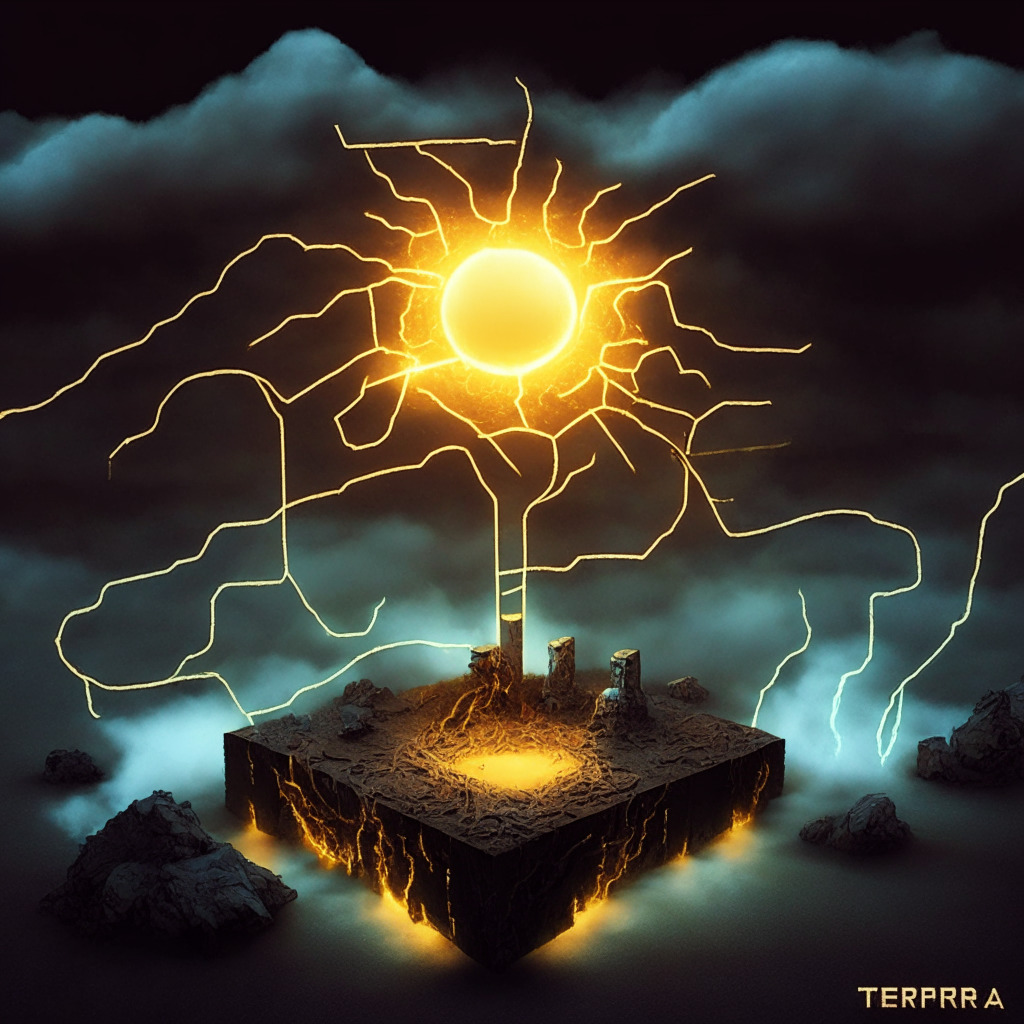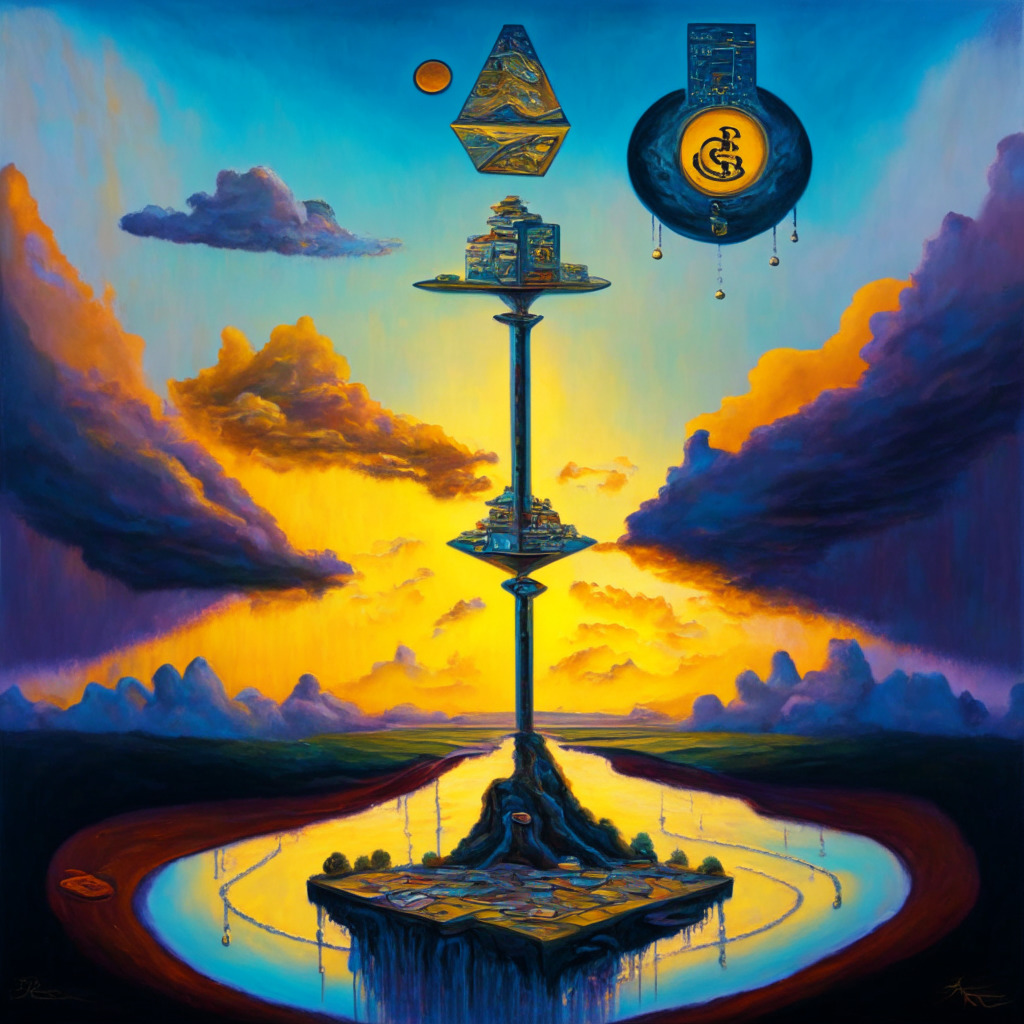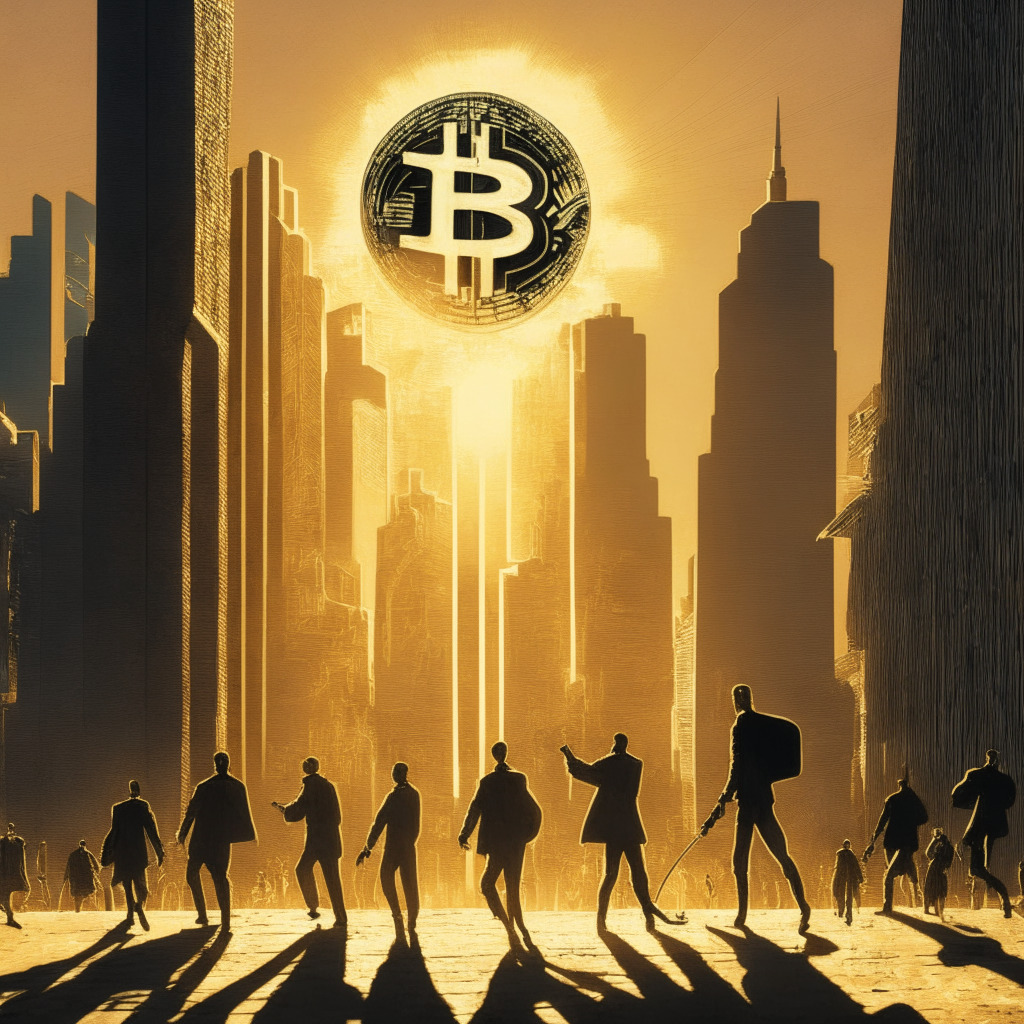Google’s entry into the Polygon PoS network could lift the blockchain’s credibility and promote mainstream adoption. But worries about centralization arise, potentially favoring powerful players over blockchain’s spirit of decentralization. With Google Cloud as a validator, maintaining a balance between corporate involvement and the founding principles of decentralization is essential.
Search Results for: ALI
Scaling Into the Land of the Rising Sun: Arbitrum Foundation and Fracton Ventures Set to Conquer Japan
“Arbitrum Foundation, a supporter of the Ethereum Layer 2 network, is partnering with Fracton Ventures to tap into the Japanese market. The alliance will focus on ecosystem construction and furnish community education, promoting Arbitrum’s adoption by Japanese developers and investors.”
Scaling the Regulatory Walls: Challenges and Solutions for Digital Asset Markets
The World Federation of Exchanges (WFE) proposed six measures to ensure the safety and sustainability of digital asset markets. These include clear segregation of market infrastructure functions and establishing systems to manage user risks. The WFE also emphasized the need for crypto exchanges to demonstrate full backing of user assets and be sufficiently regulated.
PayPal’s Expanding Crypto Vision: A Rising Star or Shadow on Decentralization?
“PayPal is deepening its alignment with the crypto ecosystem, recently filing patents to expand various sectors within cryptocurrency. Developments include plans for steering blockchain requests to specific miners, enabling off-chain transactions in NFT marketplaces, and introducing a cross-metaverse ‘omniverse’ that tailors digital asset recommendations. Critics question potential centralization while supporters anticipate increased accessibility.”
Exploring Russia’s Pivot to Crypto: Boosting Trade Ties or Cannibalizing Traditional Banking?
Russian entrepreneurs aim to use “digital assets” and a “unified digital currency” for trade with BRICS and other nations. The idea of utilizing digital financial assets (DFAs), which may encompass digitized commodities, CBDCs, digital securities, cryptoassets, and stablecoins, in international payments is garnering attention. The possibility of creating a unified digital currency for cross-border transactions is also being evaluated.
Surging Towards Ethereum ETF: A Leap Forward or A Step Back for Decentralized Crypto Markets?
“The buzz about the possible launch of an Ethereum futures exchange-traded fund (ETF) is palpable. However, this hastens a potential marketing assault to push its adoption. These instruments, while institutionalizing crypto markets, could amplify volatility and potentially overshadow smaller retail traders and traditional crypto philosophy.”
Regional Crypto Reality: From VPN Penalties to CBDC Airdrops in Asia’s Landscape
“In the Asian crypto landscape, contrasting narratives surface – rigid policy making restricts tech freedom, exemplified by a developer penalized for VPN use by China’s Great Firewall, versus progressive digital adoption, as evidenced by Hangzhou’s 10 million e-CNY airdrop and Alibaba’s move into crypto securities.”
Burning Man and DAOs: A Hybrid Model for Decentralized Governance and Broader Adoption
“Decentralized Autonomous Organizations (DAOs) could gain broader acceptance and adoption by marrying central planning with decentralized governance. This hybrid model could allow DAOs to gain recognition outside the crypto sphere, potentially fostering broader appeal and breaking away from their crypto rigidity.”
PayPal’s NFT Venture: A Bold Leap into Blockchain or a Risk to Decentralization?
“PayPal’s recent patent application for a non-fungible token (NFT) purchase and transfer system boldy underscores the mainstream acceptance of blockchain technology. The filing suggests designs to leverage NFTs for tokenization, far beyond digital collectibles. However, it also proposes off-chain transactions potentially diverging from the philosophy of complete decentralization that attracted enthusiasts to blockchain technology.”
Huge Debates Arising Over Validator Commissions and Infrastructure Provider Funding in Terra Classic Community
The Terra Classic community debates two critical proposals: correcting an unintentional 0% validators’ commission rate, which current votes lean towards rejection, and the recognition and financial support for top-tier infrastructure provider, Allnodes which also currently faces rejection. Concurrently, BTCMTX offers an innovative Stake-to-Mine model making Bitcoin mining accessible.
Marathon Digital’s Mining Misstep: An Unexpected Validator of Bitcoin’s Security or a Wake Up Call?
Marathon Digital recently confessed to mining an invalid block during an operation enhancement experiment, which triggered concerns in the cryptocurrency community. Despite this, Bitcoin’s correction of the error highlighted the strength of its security systems. Marathon remains undeterred, continuing to focus on efficiency initiatives, amid a 134% year-on-year rise in mining efficiency and improved revenues.
Invalid Block Mining: A Fluke or Cause for Concern in Blockchain Innovation
“Marathon Digital, a Bitcoin miner, inadvertently mined an invalid block due to a bug during an internal experiment. Critics argue this shows the danger of conducting risky experiments on live blockchain networks. However, experts argue this incident illustrates the robust security features of the Bitcoin network, which successfully regulated the anomaly.”
Beacon or Blunder: Analyzing Marathon’s Invalid Bitcoin Block Mining Experiment
In a recent development, Bitcoin mining company, Marathon Digital, admitted to creating an invalid Bitcoin block, purportedly as part of an experimental operational optimization. While this initially raised concerns over potential vulnerabilities within Bitcoin’s network, it notably showcased Bitcoin’s robust security, which efficiently neutralized the invalid block.
AI and Crypto: Striking the Balance Between Hype and Reality
“AI has greatly impacted the crypto industry, particularly in automated trading through AI-powered bots. However, these bots still lack sophistication in complex trading. AI also helps produce insights from vast crypto data, proving useful in assessing market risks. Despite its potential, AI’s access to off-chain centralized exchanges data is limited, impairing its accuracy.”
Belgian Crypto Marker Keyrock Wins Approval from Swiss Regulator: A Leap or a Slip in Crypto’s Decentralized Vision?
“Belgian-based crypto market maker Keyrock achieved regulatory clearance from the Swiss Financial Services Standards Association after a thorough inspection confirmed compliance with antimoney laundering requirements. This endorsement, alongside expansion plans and a secured $72 million in funding, indicates Keyrock’s commitment to transparency, regulatory compliance, and the evolution of the crypto landscape.”
Navigating the Crypto Conundrum: Striking Balance between Regulations and Decentralization
The article discusses the recent imprisonment of AirBit Club co-founder Pablo Renato Rodriguez, shedding light on the profound need for regulations in cryptocurrency. It emphasizes that while regulations can foster trust and protection for investors, they mustn’t undermine the innate decentralization and freedom of cryptocurrencies. The delicate balance between regulation and freedom is key for future industry growth.
Decentralizing Crypto Prices: The Pros and Cons of Relying on Blockchain for Price Estimates
The UTXOracle, a tool created by a developer @SteveSimple, uses Python programming to independently trace Bitcoin’s price using a Bitcoin Core full node, without relying on external sources. This open-source tool calculates an average daily USD price for Bitcoin by scrutinizing block patterns, offering a decentralized method, as opposed to obtaining price info from centralized exchanges. These capabilities can impact crypto smart contracts and promote a fully decentralized finance system.
Draper’s Vision vs Reality: Bitcoin’s $250,000 Future Hindered by US Government Regulation
Tim Draper, a notable venture capitalist, contends that the U.S. government’s approach to blockchain regulation is obstructing the growth and adoption of this technology. Despite regret for his misfired prediction of Bitcoin hitting $250,000 by 2022, Draper sees a promising future for blockchain and crypto markets.
Cryptocurrency Critic Senator Menendez Embroiled in Bribery Scandal: Irony or Reality?
“U.S. Senator Robert Menendez, known for his disapproval of cryptocurrencies like Bitcoin, ironically finds himself in a scandal involving traditional bribery means. He’s accused of accepting bribes, pointing out the contrast to his criticisms of crypto enabling criminal activities.”
Three Drivers of Cryptocurrency Market Growth: BTC ETFs, Regulatory Progress, and Scaling Solutions
The article identifies three potential growth catalysts for the cryptocurrency market: approval of Bitcoin ETFs, positive regulatory changes, and advancements in blockchain scaling. It spotlights BlackRock’s Bitcoin ETF application, Ripple and Grayscale’s victories against the SEC, and progress in Ethereum layer-2 scaling solutions. Crucial investment details about various cryptocurrencies are also discussed in light of market volatility and shifting trends.
Decoding Vitalik Buterin’s Privacy Pool Concept: Navigating Blockchain Privacy & Regulatory Compliance
Ethereum co-founder Vitalik Buterin’s proposed privacy pool concept focuses on combining blockchain privacy and regulatory compliance, sparking meaningful discussion in the crypto world. However, concerns over unclear compliance framework, implementation struggles, and acceptance issues remain to be addressed.
Decoding Chainlink’s Multisig Wallet Controversy: Centralization Concerns Vs. Market Performance
Chainlink recently altered its multisig wallet’s signature rule, shifting from a 4-of-9 to a 4-of-8 requirement. Critics suggest this change and removal of a wallet address may indicate potential centralized control risking the DeFi ecosystem’s integrity. Regardless, Chainlink maintains its utility in DeFi projects and its token value keeps growing.
Chainlink’s Signature Change: A Decentralization Dilemma Stirring Trust and Security Concerns
Chainlink recently made an unannounced change to its multi-signature wallet. The number of signatures required for transactions was reduced, which raised concerns about the decentralization risk of the blockchain platform. Despite clarifications from Chainlink, the skepticism remains and highlights the often unresolved trade-off between absolute decentralization and absolute security in the blockchain world.
Coinbase’s Huge BTC Holdings: Sign of Dominance or Call for Decentralization?
“Cryptocurrency exchange Coinbase reportedly holds 1 million Bitcoin, about 5% of total in existence. However, fears of centralized exchanges halting withdrawals have caused controversy. The company’s ongoing accumulation amid regulatory scrutiny also raises concern. Conversely, its holdings and financial performance highlight its industry dominance.”
Decentralization of AI: Inhibition by Regulation vs Growth through Open-Sourcing
“Brian Armstrong, CEO of Coinbase, is advocating for a ‘laissez-faire’ approach to artificial intelligence (AI) development, opposing AI regulation as it stifles innovation. He suggests decentralization and open sourcing as alternatives. Despite potential risks, Armstrong believes in fostering growth and rapid development in the AI field.”
DeFi Dip or Adjustment: Analyzing Recent Drop in Decentralized Finance Activity
“The DeFi sector experienced a 15.5% drop in August, leading to speculations of losing steam. Despite this, investor interest remains strong with blockchain infrastructure and DeFi investments totalling $580 million. The growth of DApp ecosystems offers optimism, but recent security breaches cause concern.”
Machiavellian Principles as a Key to Decentralized Governance: Opportunities and Challenges
“Machiavellian principles are seen as a potential solution for issues concerning decentralized autonomous organizations (DAOs) such as power centralization, according to venture capital firm Andreessen Horowitz. DAOs must balance power, entertain constant opposition, and adopt lockup mechanisms for stakeholders to achieve effective decentralized governance.”
Navigating California’s New Crypto Regulation: Analyzing AB 39’s Impact on Digital Finance
California reintroduces a crypto regulation bill, AB 39, following AB 2269’s veto in 2022. This new regulation requires licensing for businesses dealing in digital financial assets with California residents, impacting a range of activities including transferring, exchanging, or storing digital assets like Bitcoin. The goal is to balance consumer protection and innovation, despite some ambiguous provisions.
NFT Market’s Brutal Reality Check: From Glory to Near Worthlessness
“The majority (over 95%) of NFT collections are currently viewed as devoid of worth, reflecting the dramatic deflation of the NFT bubble. Amongst the top 8,850 collections, 18% are deemed worthless with a further 41% priced between $5 to $10.”
Decentralized Future: How Blockchain Transforms the Adult Content Industry Amidst Controversies
“Content creators are exploring decentralised alternatives amid issues with traditional platforms like OnlyFans and Patreon. Web3 technology promises greater control and financial security, shifting power away from intermediaries. Blockchain-based alternatives like Only1 are offering creators a chance to realise their full earning potential and evade censorship.”
Regulatory Conflict: ASIC’s Crackdown on Crypto Exchange Bit Trade in Australia
“The ASIC alleges that Bit Trade failed to make a target market determination before launching its margin trading product in Australia, leading to customers experiencing combined losses of about $12.95 million. This highlights the ongoing struggle to properly regulate crypto and traditional finance intersection.”
JPEX Exchange Halts Operations: A Setback or a Gateway to Decentralized Future?
The Hong Kong cryptocurrency exchange, JPEX, has temporarily ceased operations due to a legal probe by the Securities and Futures Commission, resulting in the arrest of a key person. JPEX, operating without a local license, has faced user grievances and is also undergoing friction in Taiwan with affiliated influencers.






























